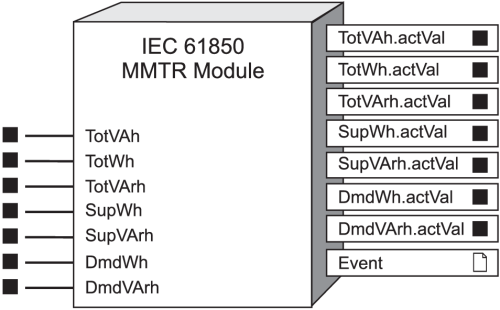IEC 61850 MMTR Module
The IEC 61850 MMTR module represents the Metering (MMTR) Logical Node in IEC 61850 protocol.
Module icon
![]()
Overview
It maps the appropriate ION values to their IEC 61850 counterparts. The MMTR Logical Node provides the calculated energy from voltage and current measurements. These energy values are generally used for billing purposes. Only one instance of this module can exist. Because this module is specific to supporting the IEC 61580 protocol, it can be deleted if IEC 61850 is not required.
NOTE: This module is configured as part of the meter’s implementation of the IEC 61850 protocol. Manual creation and configuration of this module, or modification of an existing module, is an advanced feature that should only be undertaken by personnel with a thorough understanding of ION and IEC 61850 protocols, and the system in which the meter is installed.
For more information about IEC 61850, please refer to the IEC 61850 and ION Technology protocol document.

NOTE: The registers and settings available in this module depend on the device or node you are configuring, as well as its firmware and template versions. Not all registers or settings are available on all devices or the Virtual Processor, and labels may vary.
Inputs
By default, the MMTR module inputs are connected to the outputs of specific, energy-related Integrator modules.
NOTE: If input registers are changed, the new inputs must have the same units as the original inputs.
 TotVAh
TotVAh
This register is connected to the output of the kVAh del-rec Integrator module, which is the net apparent energy since the last reset. Units are kVAh.
 TotWh
TotWh
This register is connected to the output of the kWh del-rec Integrator module, which is the net real energy since the last reset. Units are kWh.
 TotVArh
TotVArh
This register is connected to the output of the kVARh del-rec Integrator module, which is the net reactive energy since the last reset. Units are kVARh.
 SupWh
SupWh
This register is connected to the output of the kWh del Integrator module, which is the real energy supplied to the meter since the last reset. Units are kWh.
 SupVArh
SupVArh
This register is connected to the output of the kVArh del Integrator module, which is the reactive energy supplied to the meter since the last reset. Units are kVARh.
 DmdWh
DmdWh
This register is connected to the output of the kWh rec Integrator module, which is the real energy demand since the last reset. Units are kWh.
 DmdVArh
DmdVArh
This register is connected to the output of the kVARh rec Integrator module, which is the reactive energy demand since the last reset. Units are kVARh.
Setup registers
The MMTR module has no setup registers.
Output registers
These registers are formatted and named according to IEC 61850 protocol standards. These registers have the same units as their corresponding inputs.
 TotVAh.actVal
TotVAh.actVal
This register contains the net apparent energy (kVAh del-rec) since the last reset, taken from the TotVAh input.
 TotVAh.actVal
TotVAh.actVal
This register contains the net real energy (kWh del-rec) since the last reset, taken from the TotWh input.
 TotVArh.actVal
TotVArh.actVal
This register contains the net reactive energy (kVARh del-rec) since the last reset, taken from the TotVArh input.
 SupWh.actVal
SupWh.actVal
This register contains the real energy supply (kWh del), taken from the SupWh input.
 SupVArh.actVal
SupVArh.actVal
This register contains the reactive energy supply (kVARh del), taken from the SupVArh input.
 DmdWh.actVal
DmdWh.actVal
This register contains the real energy demand (kWh rec), taken from the DmdWh input.
 DmdVArh.actVal
DmdVArh.actVal
This register contains the reactive energy demand (kVARh rec), taken from the DmdVArh input.
 Event
Event
Events produced by the module are recorded in the Event register.
Possible events and their associated priority numbers are shown in the following table.
| Event priority group | Priority | Description |
|---|---|---|
| Reset | 5 | A module reset has occurred. |
| Setup Change | 10 | Input links, setup registers or labels have changed. |
| Information | 25 | not available input caused output to go not available. |
The Event output register stores the following information for each ION event: time stamp, priority, cause, effect, and any values or conditions associated with the cause and effect.